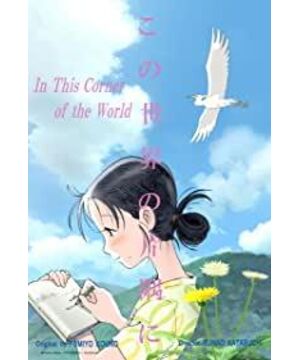Lu Xun once said in the article "On the Fall of Leifeng Pagoda": "Tragedy is to destroy the valuable things in life for others to see." From this sentence, we can draw two essences of tragedy. One: Tragedy expresses "the value of life", and the other: The final result of this valuable thing in life is "destruction for others to see".
"Some people always say that I like to be in a daze."
With the outline of a self-report and a few scene dialogues, the audience is quickly taken into the Japan of the Showa era, and also quickly discovers that the protagonist who takes us into this era is such a "simple" temperament ( Character): She is small, soft, sweet, or smiling with her head raised, or her hair lowered slightly, always trying her best to avoid attracting the attention of others, and others will always inexplicably "ignore her" "she.
A confused, harmless, happy Japanese woman at the bottom, this is the basic character of the heroine, and it is also the entry point of the whole film.
"Although life is not easy, the children are still happy."
In the first fifteen minutes of the film, when the heroine is still in the pure world of children, the atmosphere of the whole film is like the sky the heroine's family saw on the beach when they returned from their grandmother's house, filled with warm tones. Cozy and relaxing, typical of summer evenings. Interspersed between this specific reality and daily life are two "fantasies" full of childish colors. These two "fantasies" not only make us smile, but also make this peach blossom-like life more like a dream The illusory sense of nothingness, like soap bubbles in the sun, is gorgeous and fragile.
At 11 minutes of the film, Zhe, one of the supporting characters of the film, appeared. Zhe's appearance brought the first tragic color in the whole film:
This dialogue between the heroine and Zhe has two main functions:
One: To explain his dislike of the sea and the reasons, one is from his parents who are lazy and alcoholic and refuse to go to work in the sea, and the other is from his brother who died in the sea as a navy (due to the naval enlistment).
Two: Death and war are beginning to show their faces.
At the 12th minute of the film, the director made a very important transition with a photo and a pencil drawing: the older brother of the heroine who had appeared earlier joined the army. (Zhe just mentioned his brother who died in the sea because of joining the army in the last minute)
At the 15th minute of the film, the heroine got the news that someone came to propose a marriage, which marked that the whole film officially entered the adult perspective. At the same time, on the heroine's way home, the heroine met Tetsu again, but at this time Tetsu was wearing a Japanese navy uniform and embarked on a life path that he hated and feared since he was a child. This destined helplessness and powerlessness is the result of the individual's will being coerced and oppressed by the social torrent. (When I look back at this scene, I always think of the young but shadowy face of Pacino after Pacino became the godfather in "The Godfather". The same appearance shows his resistance to the family business, the same fateful look. become the person you least wanted to be in the past.)
Between the 17th and 36th minutes of the film, the film continues the "happy" style at the beginning, weaving a lot of laughs with the confused character of the heroine and the break-in period when she first arrived in the new environment. Optimism, comedy treatment of tragic material (making multigrain rice), and flat treatment of extremely tragic material. (for the worry of the silent brother). This technique does not only appear in this part of the film, but runs through the whole film and becomes the main means of processing content and emotion in the film.
At 36 minutes, war and death once again appeared in the life of the heroine in a direct form with a clear face, that is, in front of the audience.
Although the clips involving the heroine's life are still accompanied by laughter, with the advancement of the timeline (the film is also historical), more and more tragic elements appear in the details of the film:
At 54 minutes of the film, the heroine appeared a line that did not seem to match the character:
The background and reason why the heroine said this line is that the price of Japanese goods at this time has soared to an unbearable level for the bottom residents. In fact, this scene also reiterates or makes it clear that the whole film revolves around the female protagonist who is a Japanese low-level female. What we can see from this film is what the female protagonist set by this person can do. saw.
As the time passed, the content of the film gradually changed from the heroine's daily life to the projection of war and death, and this change was not because the camera turned to other places, but the war and death began to gradually swallow up the original normal life. The latter squeezes out the lens.
At 65 minutes of the film, Zhe reappeared in the heroine's life, and after setting a very standard flag, he said goodbye to the heroine. After that, when the camera turned, what appeared in front of us was the news of the death of the heroine's brother. In the first half of the film, my brother joined the army after the dialogue between the heroine and Zhe.
The film still adopts the dual method of compressing the length and downplaying the color of this worship scene. On the one hand, it tries to be as concise as possible, and on the other hand, it uses the comedy color brought by the bickering of the husband and wife to dilute the tragic color brought about by the death of the brother. The air raid scene that appeared for the first time in the film after this scene is still handled in this way, diverting the audience's attention with the comedy sense of the heroine's "feigned death", and downplaying the tension and death threat brought by the air raid.
At 85 minutes into the film, the film has its first direct death: Harumi, who died in an air raid.
When Qingmei's mother is also the sister of the heroine's husband (can't remember what the heroine should call her--.) when she was in grief in front of the heroine's bed, the heroine's mother-in-law, Qingmei's grandmother stepped forward to comfort Qingmei's mother: "Don't do this, it's time to distribute the tofu."
This seemingly absurd remark, when carefully scrutinized, contains countless sadness.
Death has become a common occurrence here and now. People have seen so many deaths that even if their loved ones died, they can't spend too much time crying, because the living people still have to live, and they have to use these grief time to give life to the living. The people ask for a sustenance to survive.
At 90 minutes of the film, we saw the heroine show a different "posture" for the first time: hysterical, desperate to extinguish the incendiary bomb that fell into the home.
"I have lost so much, how can I let you take away the rest in front of my eyes."
At 97 minutes of the film, an egret representing the hometown fell in front of the heroine, who chased and urged it to return to Hiroshima, to her home in her heart, and to the safest place in her heart.
A few minutes after the film, Hiroshima was bombed by an atomic bomb.
At subsection 108 of the film, the emperor announces his surrender. The heroine was indignant when she heard the broadcast:
"Why
Isn't this something to be conscious of from the beginning?
Didn't you say you have to fight to the last person?
There are five people here now
Obviously I still have my left hand and my feet."
"Is my past so blown away?
what I always thought was reasonable
The reason I've been patient with has flown away
Rice and soybeans from the sea
It's all made of these.
So we have to give in to violence?
I really hope I'm still that stupid girl who doesn't think about anything and only stays in a daze."
why?
If the final result is to admit defeat, then what is the point of this war? What for those who died because of this war, those who grieved because of those who died? If this war is meaningless, are those who died who loved me, who I loved, just disappeared so meaninglessly?
Even if they died for a hopeless slogan, a flag that I don't know the so-called, this at least has a sustenance, there is a reason to persuade them to die, to convince us to accept their death, but now, has it all disappeared?
The reason for my patience, and those who died I loved and who loved me, just flew away like dandelions?
If "Grave of the Fireflies" brings people the discomfort and discomfort that directly affects the body as they see two children die step by step without being able to do anything, then what this film brings us is living together in the past and connecting by blood. The person suddenly left your life, left your life, you can even smell him in the room, but you can no longer touch the helplessness and powerlessness brought by his fingertips, and Great sadness.
This kind of sadness and sadness has been deliberately suppressed and downplayed throughout the film, which also delayed the audience's emotional response to these tragic colors. However, this emotional response was not weakened by the dislocation of time. More and more in the continuous accumulation, and finally burst.
"You don't know, the soldier who died in front of the Neighborhood Security Pavilion seems to be my son, but I didn't find it at the time."
At this point, I'm almost done talking. I also thought about whether to make up for some of the disputes about the film that I discussed with my friends, but I thought about it later.
Just want to say, let the war stay in history and artistic creation forever.
Do not go back to the micro and micro-hu?
View more about In This Corner of the World reviews











